LAW115 Criminal Law: Detailed Case Analysis of Francis Castle
VerifiedAdded on 2023/03/23
|11
|4096
|48
Homework Assignment
AI Summary
This assignment provides a detailed analysis of the Francis Castle case, focusing on the legal arguments surrounding the charges of murder. It examines the errors made by Mr. Justice Dredd in the trial, particularly concerning the defenses of loss of self-control and diminished responsibility, as outlined in the Coroners and Justice Act 2009 and the Homicide Act 1957. The analysis explores the applicability of these defenses, considering factors such as intoxication, mental health, and the potential for an insanity plea based on the McNaughten rules. The document references relevant case law, including R v Ahluwalia, R v Duffy, and R v Clarke, to support its arguments, and discusses the importance of considering mitigating factors and ensuring that the principles of natural justice are upheld. The assignment also addresses the nuances of voluntary manslaughter and the implications of diminished responsibility in the context of the case, providing a comprehensive overview of the legal issues involved.
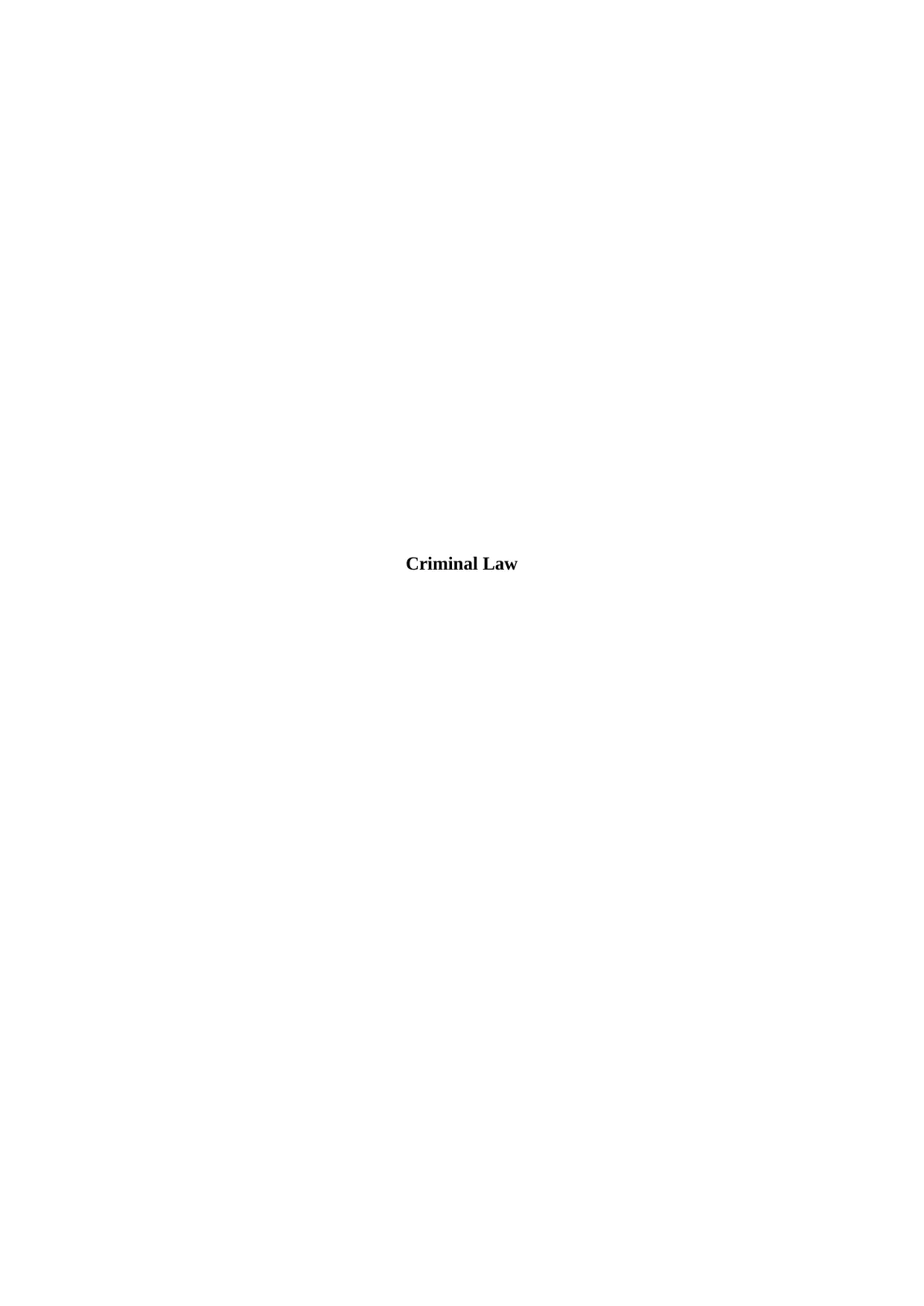
Criminal Law
Paraphrase This Document
Need a fresh take? Get an instant paraphrase of this document with our AI Paraphraser

Table of Contents
Table of Cases............................................................................................................................3
Table of Statutes.........................................................................................................................4
Answer to Question a.................................................................................................................5
Answer to Question b.................................................................................................................6
Answer to Question c.................................................................................................................7
Answer to Question d.................................................................................................................9
Bibliography.............................................................................................................................11
Table of Cases............................................................................................................................3
Table of Statutes.........................................................................................................................4
Answer to Question a.................................................................................................................5
Answer to Question b.................................................................................................................6
Answer to Question c.................................................................................................................7
Answer to Question d.................................................................................................................9
Bibliography.............................................................................................................................11
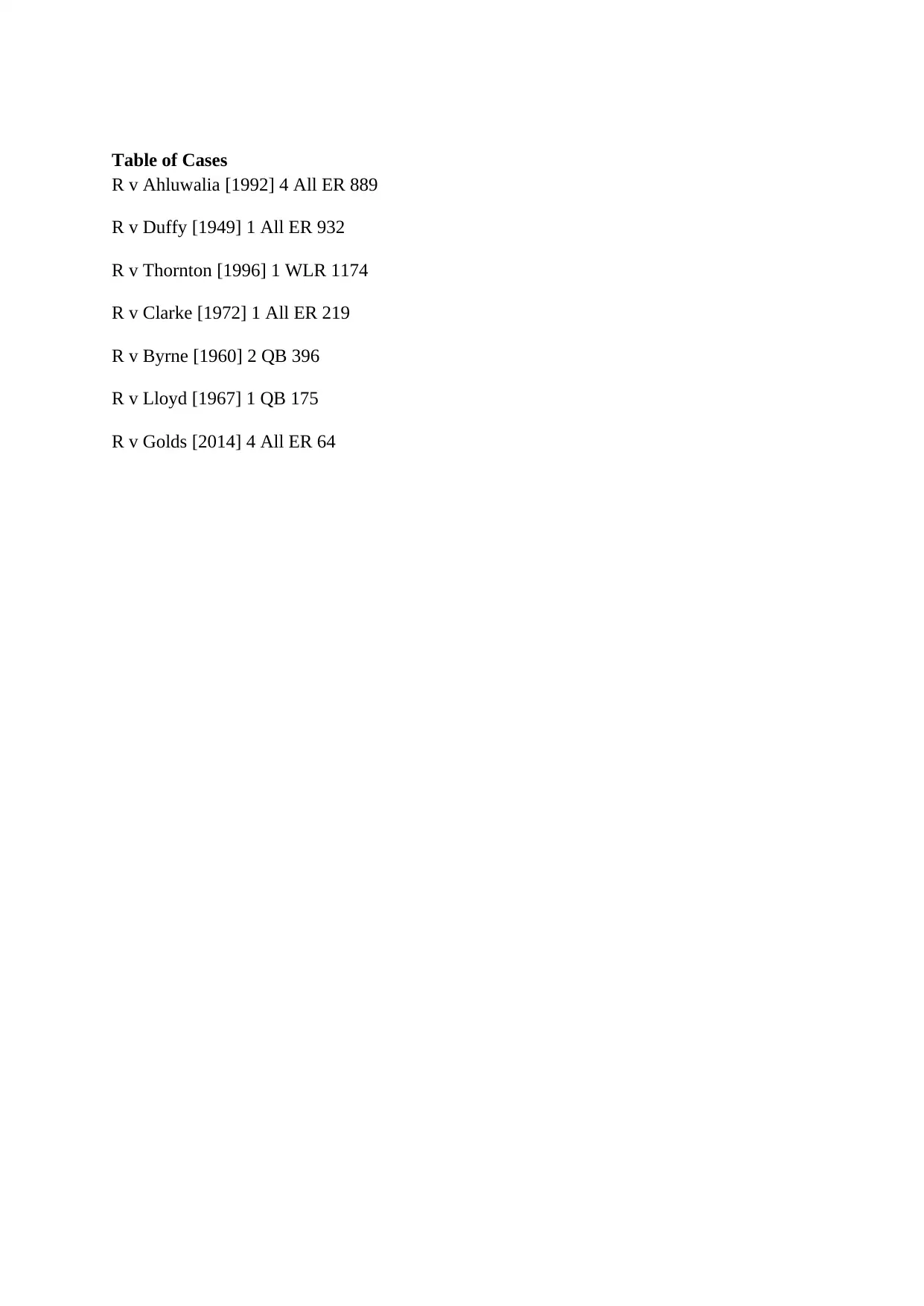
Table of Cases
R v Ahluwalia [1992] 4 All ER 889
R v Duffy [1949] 1 All ER 932
R v Thornton [1996] 1 WLR 1174
R v Clarke [1972] 1 All ER 219
R v Byrne [1960] 2 QB 396
R v Lloyd [1967] 1 QB 175
R v Golds [2014] 4 All ER 64
R v Ahluwalia [1992] 4 All ER 889
R v Duffy [1949] 1 All ER 932
R v Thornton [1996] 1 WLR 1174
R v Clarke [1972] 1 All ER 219
R v Byrne [1960] 2 QB 396
R v Lloyd [1967] 1 QB 175
R v Golds [2014] 4 All ER 64
⊘ This is a preview!⊘
Do you want full access?
Subscribe today to unlock all pages.

Trusted by 1+ million students worldwide
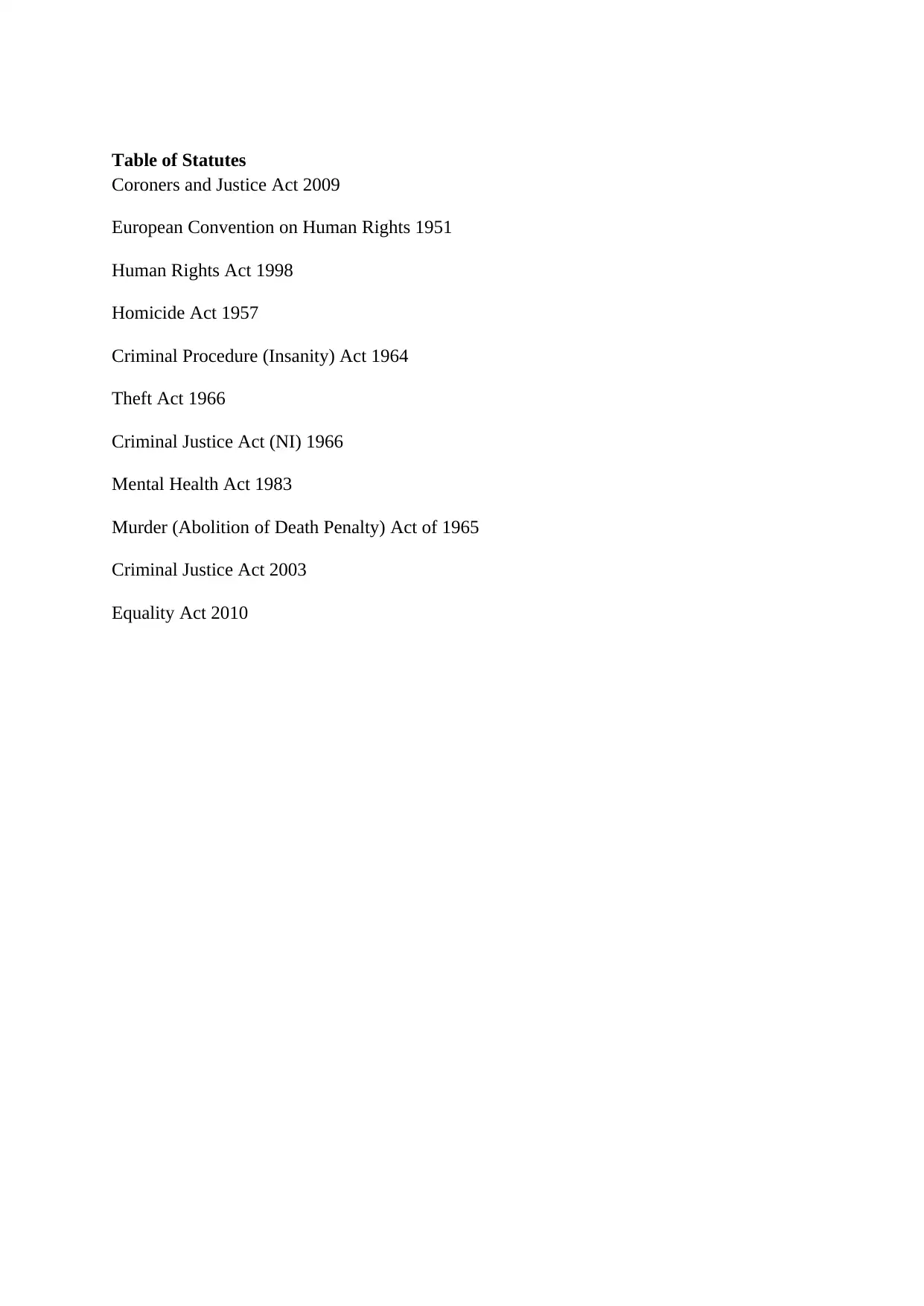
Table of Statutes
Coroners and Justice Act 2009
European Convention on Human Rights 1951
Human Rights Act 1998
Homicide Act 1957
Criminal Procedure (Insanity) Act 1964
Theft Act 1966
Criminal Justice Act (NI) 1966
Mental Health Act 1983
Murder (Abolition of Death Penalty) Act of 1965
Criminal Justice Act 2003
Equality Act 2010
Coroners and Justice Act 2009
European Convention on Human Rights 1951
Human Rights Act 1998
Homicide Act 1957
Criminal Procedure (Insanity) Act 1964
Theft Act 1966
Criminal Justice Act (NI) 1966
Mental Health Act 1983
Murder (Abolition of Death Penalty) Act of 1965
Criminal Justice Act 2003
Equality Act 2010
Paraphrase This Document
Need a fresh take? Get an instant paraphrase of this document with our AI Paraphraser
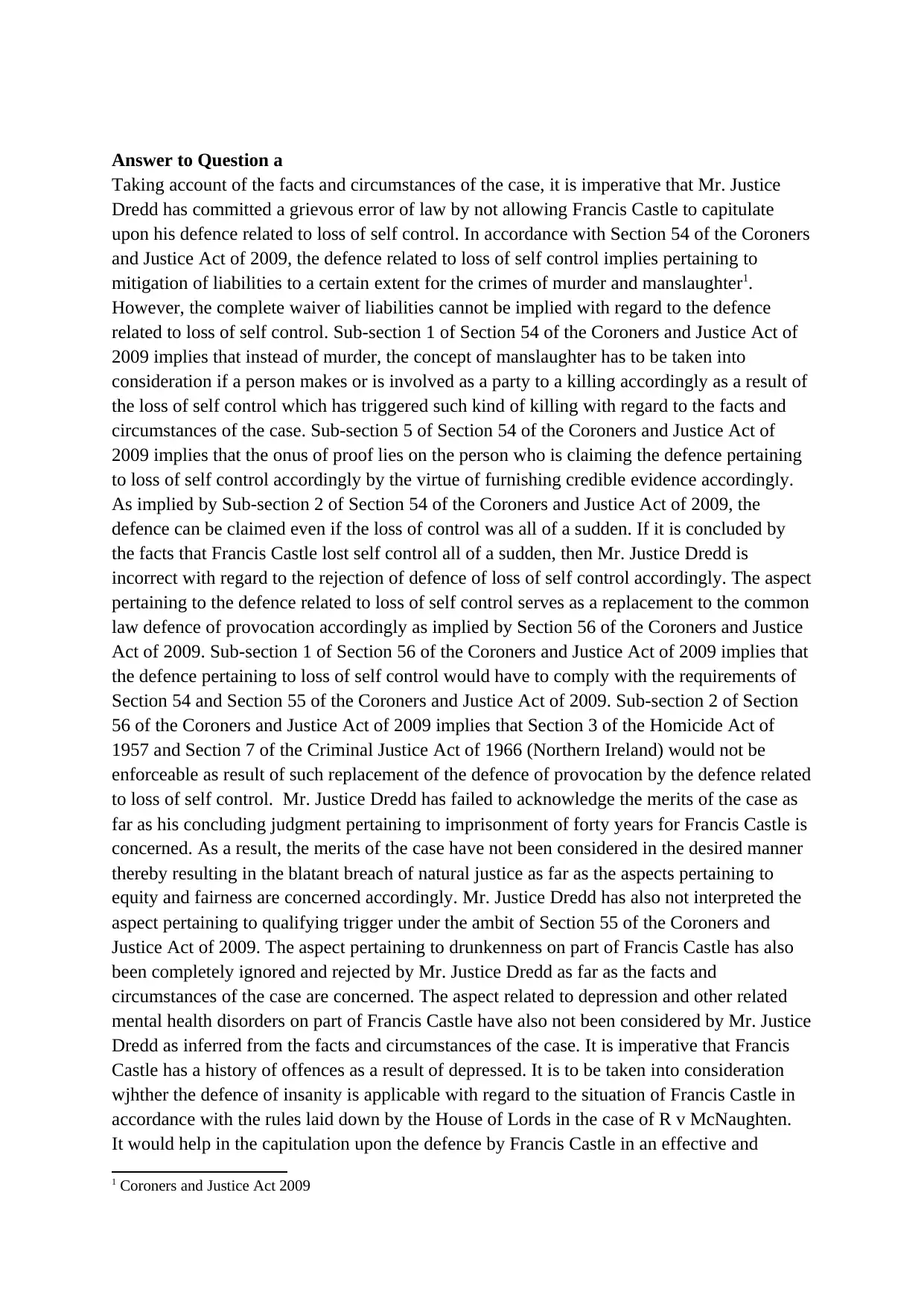
Answer to Question a
Taking account of the facts and circumstances of the case, it is imperative that Mr. Justice
Dredd has committed a grievous error of law by not allowing Francis Castle to capitulate
upon his defence related to loss of self control. In accordance with Section 54 of the Coroners
and Justice Act of 2009, the defence related to loss of self control implies pertaining to
mitigation of liabilities to a certain extent for the crimes of murder and manslaughter1.
However, the complete waiver of liabilities cannot be implied with regard to the defence
related to loss of self control. Sub-section 1 of Section 54 of the Coroners and Justice Act of
2009 implies that instead of murder, the concept of manslaughter has to be taken into
consideration if a person makes or is involved as a party to a killing accordingly as a result of
the loss of self control which has triggered such kind of killing with regard to the facts and
circumstances of the case. Sub-section 5 of Section 54 of the Coroners and Justice Act of
2009 implies that the onus of proof lies on the person who is claiming the defence pertaining
to loss of self control accordingly by the virtue of furnishing credible evidence accordingly.
As implied by Sub-section 2 of Section 54 of the Coroners and Justice Act of 2009, the
defence can be claimed even if the loss of control was all of a sudden. If it is concluded by
the facts that Francis Castle lost self control all of a sudden, then Mr. Justice Dredd is
incorrect with regard to the rejection of defence of loss of self control accordingly. The aspect
pertaining to the defence related to loss of self control serves as a replacement to the common
law defence of provocation accordingly as implied by Section 56 of the Coroners and Justice
Act of 2009. Sub-section 1 of Section 56 of the Coroners and Justice Act of 2009 implies that
the defence pertaining to loss of self control would have to comply with the requirements of
Section 54 and Section 55 of the Coroners and Justice Act of 2009. Sub-section 2 of Section
56 of the Coroners and Justice Act of 2009 implies that Section 3 of the Homicide Act of
1957 and Section 7 of the Criminal Justice Act of 1966 (Northern Ireland) would not be
enforceable as result of such replacement of the defence of provocation by the defence related
to loss of self control. Mr. Justice Dredd has failed to acknowledge the merits of the case as
far as his concluding judgment pertaining to imprisonment of forty years for Francis Castle is
concerned. As a result, the merits of the case have not been considered in the desired manner
thereby resulting in the blatant breach of natural justice as far as the aspects pertaining to
equity and fairness are concerned accordingly. Mr. Justice Dredd has also not interpreted the
aspect pertaining to qualifying trigger under the ambit of Section 55 of the Coroners and
Justice Act of 2009. The aspect pertaining to drunkenness on part of Francis Castle has also
been completely ignored and rejected by Mr. Justice Dredd as far as the facts and
circumstances of the case are concerned. The aspect related to depression and other related
mental health disorders on part of Francis Castle have also not been considered by Mr. Justice
Dredd as inferred from the facts and circumstances of the case. It is imperative that Francis
Castle has a history of offences as a result of depressed. It is to be taken into consideration
wjhther the defence of insanity is applicable with regard to the situation of Francis Castle in
accordance with the rules laid down by the House of Lords in the case of R v McNaughten.
It would help in the capitulation upon the defence by Francis Castle in an effective and
1 Coroners and Justice Act 2009
Taking account of the facts and circumstances of the case, it is imperative that Mr. Justice
Dredd has committed a grievous error of law by not allowing Francis Castle to capitulate
upon his defence related to loss of self control. In accordance with Section 54 of the Coroners
and Justice Act of 2009, the defence related to loss of self control implies pertaining to
mitigation of liabilities to a certain extent for the crimes of murder and manslaughter1.
However, the complete waiver of liabilities cannot be implied with regard to the defence
related to loss of self control. Sub-section 1 of Section 54 of the Coroners and Justice Act of
2009 implies that instead of murder, the concept of manslaughter has to be taken into
consideration if a person makes or is involved as a party to a killing accordingly as a result of
the loss of self control which has triggered such kind of killing with regard to the facts and
circumstances of the case. Sub-section 5 of Section 54 of the Coroners and Justice Act of
2009 implies that the onus of proof lies on the person who is claiming the defence pertaining
to loss of self control accordingly by the virtue of furnishing credible evidence accordingly.
As implied by Sub-section 2 of Section 54 of the Coroners and Justice Act of 2009, the
defence can be claimed even if the loss of control was all of a sudden. If it is concluded by
the facts that Francis Castle lost self control all of a sudden, then Mr. Justice Dredd is
incorrect with regard to the rejection of defence of loss of self control accordingly. The aspect
pertaining to the defence related to loss of self control serves as a replacement to the common
law defence of provocation accordingly as implied by Section 56 of the Coroners and Justice
Act of 2009. Sub-section 1 of Section 56 of the Coroners and Justice Act of 2009 implies that
the defence pertaining to loss of self control would have to comply with the requirements of
Section 54 and Section 55 of the Coroners and Justice Act of 2009. Sub-section 2 of Section
56 of the Coroners and Justice Act of 2009 implies that Section 3 of the Homicide Act of
1957 and Section 7 of the Criminal Justice Act of 1966 (Northern Ireland) would not be
enforceable as result of such replacement of the defence of provocation by the defence related
to loss of self control. Mr. Justice Dredd has failed to acknowledge the merits of the case as
far as his concluding judgment pertaining to imprisonment of forty years for Francis Castle is
concerned. As a result, the merits of the case have not been considered in the desired manner
thereby resulting in the blatant breach of natural justice as far as the aspects pertaining to
equity and fairness are concerned accordingly. Mr. Justice Dredd has also not interpreted the
aspect pertaining to qualifying trigger under the ambit of Section 55 of the Coroners and
Justice Act of 2009. The aspect pertaining to drunkenness on part of Francis Castle has also
been completely ignored and rejected by Mr. Justice Dredd as far as the facts and
circumstances of the case are concerned. The aspect related to depression and other related
mental health disorders on part of Francis Castle have also not been considered by Mr. Justice
Dredd as inferred from the facts and circumstances of the case. It is imperative that Francis
Castle has a history of offences as a result of depressed. It is to be taken into consideration
wjhther the defence of insanity is applicable with regard to the situation of Francis Castle in
accordance with the rules laid down by the House of Lords in the case of R v McNaughten.
It would help in the capitulation upon the defence by Francis Castle in an effective and
1 Coroners and Justice Act 2009
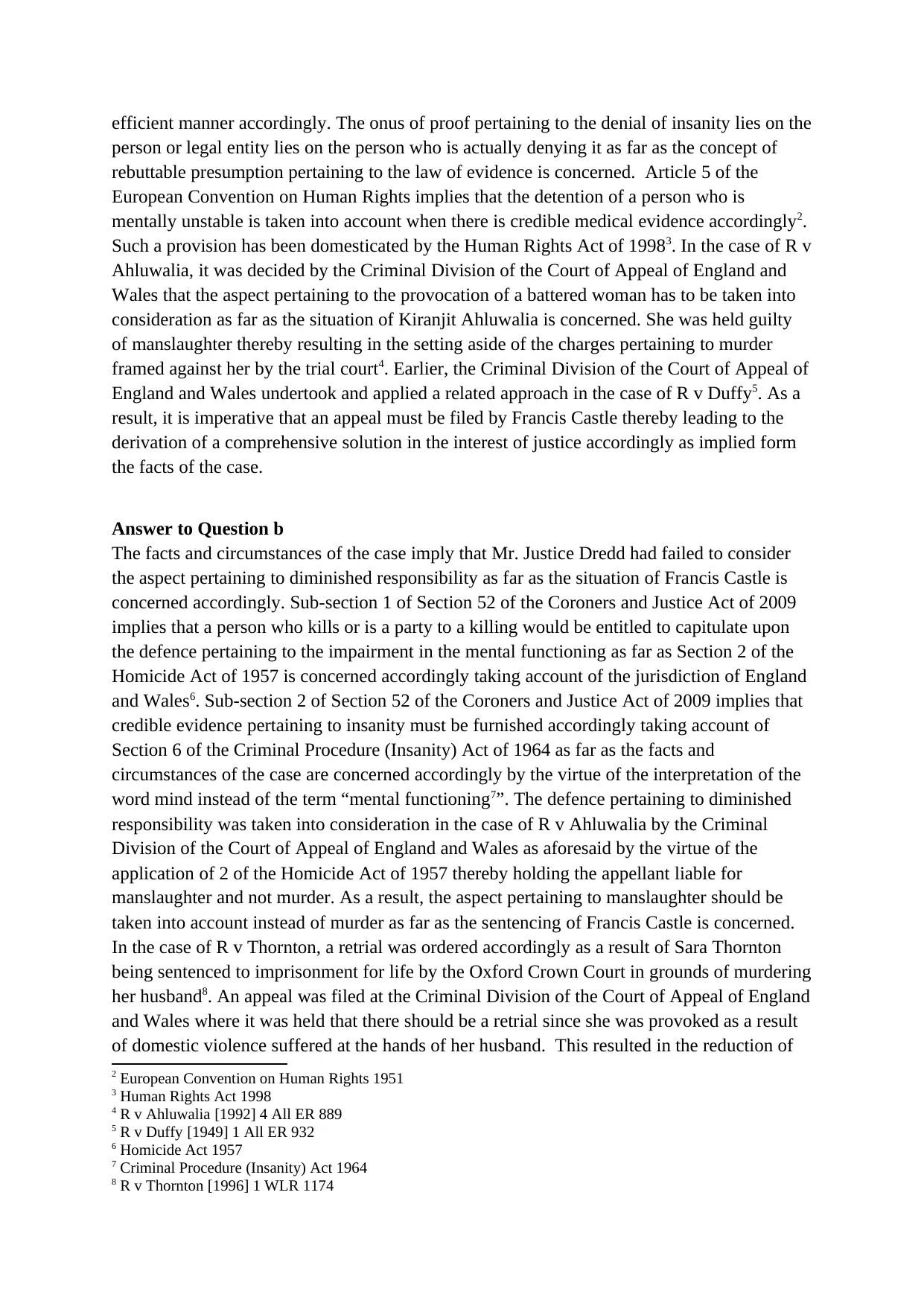
efficient manner accordingly. The onus of proof pertaining to the denial of insanity lies on the
person or legal entity lies on the person who is actually denying it as far as the concept of
rebuttable presumption pertaining to the law of evidence is concerned. Article 5 of the
European Convention on Human Rights implies that the detention of a person who is
mentally unstable is taken into account when there is credible medical evidence accordingly2.
Such a provision has been domesticated by the Human Rights Act of 19983. In the case of R v
Ahluwalia, it was decided by the Criminal Division of the Court of Appeal of England and
Wales that the aspect pertaining to the provocation of a battered woman has to be taken into
consideration as far as the situation of Kiranjit Ahluwalia is concerned. She was held guilty
of manslaughter thereby resulting in the setting aside of the charges pertaining to murder
framed against her by the trial court4. Earlier, the Criminal Division of the Court of Appeal of
England and Wales undertook and applied a related approach in the case of R v Duffy5. As a
result, it is imperative that an appeal must be filed by Francis Castle thereby leading to the
derivation of a comprehensive solution in the interest of justice accordingly as implied form
the facts of the case.
Answer to Question b
The facts and circumstances of the case imply that Mr. Justice Dredd had failed to consider
the aspect pertaining to diminished responsibility as far as the situation of Francis Castle is
concerned accordingly. Sub-section 1 of Section 52 of the Coroners and Justice Act of 2009
implies that a person who kills or is a party to a killing would be entitled to capitulate upon
the defence pertaining to the impairment in the mental functioning as far as Section 2 of the
Homicide Act of 1957 is concerned accordingly taking account of the jurisdiction of England
and Wales6. Sub-section 2 of Section 52 of the Coroners and Justice Act of 2009 implies that
credible evidence pertaining to insanity must be furnished accordingly taking account of
Section 6 of the Criminal Procedure (Insanity) Act of 1964 as far as the facts and
circumstances of the case are concerned accordingly by the virtue of the interpretation of the
word mind instead of the term “mental functioning7”. The defence pertaining to diminished
responsibility was taken into consideration in the case of R v Ahluwalia by the Criminal
Division of the Court of Appeal of England and Wales as aforesaid by the virtue of the
application of 2 of the Homicide Act of 1957 thereby holding the appellant liable for
manslaughter and not murder. As a result, the aspect pertaining to manslaughter should be
taken into account instead of murder as far as the sentencing of Francis Castle is concerned.
In the case of R v Thornton, a retrial was ordered accordingly as a result of Sara Thornton
being sentenced to imprisonment for life by the Oxford Crown Court in grounds of murdering
her husband8. An appeal was filed at the Criminal Division of the Court of Appeal of England
and Wales where it was held that there should be a retrial since she was provoked as a result
of domestic violence suffered at the hands of her husband. This resulted in the reduction of
2 European Convention on Human Rights 1951
3 Human Rights Act 1998
4 R v Ahluwalia [1992] 4 All ER 889
5 R v Duffy [1949] 1 All ER 932
6 Homicide Act 1957
7 Criminal Procedure (Insanity) Act 1964
8 R v Thornton [1996] 1 WLR 1174
person or legal entity lies on the person who is actually denying it as far as the concept of
rebuttable presumption pertaining to the law of evidence is concerned. Article 5 of the
European Convention on Human Rights implies that the detention of a person who is
mentally unstable is taken into account when there is credible medical evidence accordingly2.
Such a provision has been domesticated by the Human Rights Act of 19983. In the case of R v
Ahluwalia, it was decided by the Criminal Division of the Court of Appeal of England and
Wales that the aspect pertaining to the provocation of a battered woman has to be taken into
consideration as far as the situation of Kiranjit Ahluwalia is concerned. She was held guilty
of manslaughter thereby resulting in the setting aside of the charges pertaining to murder
framed against her by the trial court4. Earlier, the Criminal Division of the Court of Appeal of
England and Wales undertook and applied a related approach in the case of R v Duffy5. As a
result, it is imperative that an appeal must be filed by Francis Castle thereby leading to the
derivation of a comprehensive solution in the interest of justice accordingly as implied form
the facts of the case.
Answer to Question b
The facts and circumstances of the case imply that Mr. Justice Dredd had failed to consider
the aspect pertaining to diminished responsibility as far as the situation of Francis Castle is
concerned accordingly. Sub-section 1 of Section 52 of the Coroners and Justice Act of 2009
implies that a person who kills or is a party to a killing would be entitled to capitulate upon
the defence pertaining to the impairment in the mental functioning as far as Section 2 of the
Homicide Act of 1957 is concerned accordingly taking account of the jurisdiction of England
and Wales6. Sub-section 2 of Section 52 of the Coroners and Justice Act of 2009 implies that
credible evidence pertaining to insanity must be furnished accordingly taking account of
Section 6 of the Criminal Procedure (Insanity) Act of 1964 as far as the facts and
circumstances of the case are concerned accordingly by the virtue of the interpretation of the
word mind instead of the term “mental functioning7”. The defence pertaining to diminished
responsibility was taken into consideration in the case of R v Ahluwalia by the Criminal
Division of the Court of Appeal of England and Wales as aforesaid by the virtue of the
application of 2 of the Homicide Act of 1957 thereby holding the appellant liable for
manslaughter and not murder. As a result, the aspect pertaining to manslaughter should be
taken into account instead of murder as far as the sentencing of Francis Castle is concerned.
In the case of R v Thornton, a retrial was ordered accordingly as a result of Sara Thornton
being sentenced to imprisonment for life by the Oxford Crown Court in grounds of murdering
her husband8. An appeal was filed at the Criminal Division of the Court of Appeal of England
and Wales where it was held that there should be a retrial since she was provoked as a result
of domestic violence suffered at the hands of her husband. This resulted in the reduction of
2 European Convention on Human Rights 1951
3 Human Rights Act 1998
4 R v Ahluwalia [1992] 4 All ER 889
5 R v Duffy [1949] 1 All ER 932
6 Homicide Act 1957
7 Criminal Procedure (Insanity) Act 1964
8 R v Thornton [1996] 1 WLR 1174
⊘ This is a preview!⊘
Do you want full access?
Subscribe today to unlock all pages.

Trusted by 1+ million students worldwide
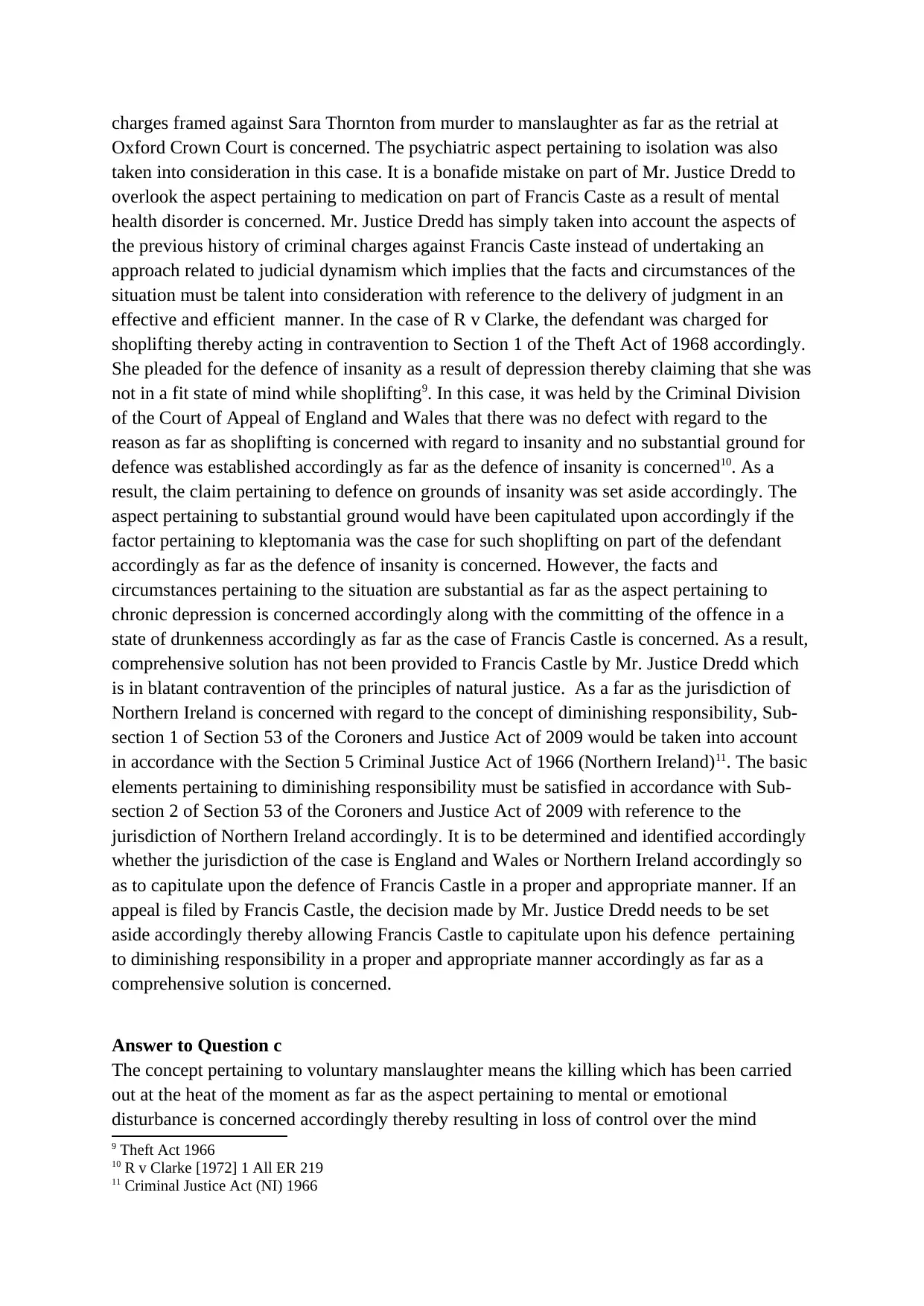
charges framed against Sara Thornton from murder to manslaughter as far as the retrial at
Oxford Crown Court is concerned. The psychiatric aspect pertaining to isolation was also
taken into consideration in this case. It is a bonafide mistake on part of Mr. Justice Dredd to
overlook the aspect pertaining to medication on part of Francis Caste as a result of mental
health disorder is concerned. Mr. Justice Dredd has simply taken into account the aspects of
the previous history of criminal charges against Francis Caste instead of undertaking an
approach related to judicial dynamism which implies that the facts and circumstances of the
situation must be talent into consideration with reference to the delivery of judgment in an
effective and efficient manner. In the case of R v Clarke, the defendant was charged for
shoplifting thereby acting in contravention to Section 1 of the Theft Act of 1968 accordingly.
She pleaded for the defence of insanity as a result of depression thereby claiming that she was
not in a fit state of mind while shoplifting9. In this case, it was held by the Criminal Division
of the Court of Appeal of England and Wales that there was no defect with regard to the
reason as far as shoplifting is concerned with regard to insanity and no substantial ground for
defence was established accordingly as far as the defence of insanity is concerned10. As a
result, the claim pertaining to defence on grounds of insanity was set aside accordingly. The
aspect pertaining to substantial ground would have been capitulated upon accordingly if the
factor pertaining to kleptomania was the case for such shoplifting on part of the defendant
accordingly as far as the defence of insanity is concerned. However, the facts and
circumstances pertaining to the situation are substantial as far as the aspect pertaining to
chronic depression is concerned accordingly along with the committing of the offence in a
state of drunkenness accordingly as far as the case of Francis Castle is concerned. As a result,
comprehensive solution has not been provided to Francis Castle by Mr. Justice Dredd which
is in blatant contravention of the principles of natural justice. As a far as the jurisdiction of
Northern Ireland is concerned with regard to the concept of diminishing responsibility, Sub-
section 1 of Section 53 of the Coroners and Justice Act of 2009 would be taken into account
in accordance with the Section 5 Criminal Justice Act of 1966 (Northern Ireland)11. The basic
elements pertaining to diminishing responsibility must be satisfied in accordance with Sub-
section 2 of Section 53 of the Coroners and Justice Act of 2009 with reference to the
jurisdiction of Northern Ireland accordingly. It is to be determined and identified accordingly
whether the jurisdiction of the case is England and Wales or Northern Ireland accordingly so
as to capitulate upon the defence of Francis Castle in a proper and appropriate manner. If an
appeal is filed by Francis Castle, the decision made by Mr. Justice Dredd needs to be set
aside accordingly thereby allowing Francis Castle to capitulate upon his defence pertaining
to diminishing responsibility in a proper and appropriate manner accordingly as far as a
comprehensive solution is concerned.
Answer to Question c
The concept pertaining to voluntary manslaughter means the killing which has been carried
out at the heat of the moment as far as the aspect pertaining to mental or emotional
disturbance is concerned accordingly thereby resulting in loss of control over the mind
9 Theft Act 1966
10 R v Clarke [1972] 1 All ER 219
11 Criminal Justice Act (NI) 1966
Oxford Crown Court is concerned. The psychiatric aspect pertaining to isolation was also
taken into consideration in this case. It is a bonafide mistake on part of Mr. Justice Dredd to
overlook the aspect pertaining to medication on part of Francis Caste as a result of mental
health disorder is concerned. Mr. Justice Dredd has simply taken into account the aspects of
the previous history of criminal charges against Francis Caste instead of undertaking an
approach related to judicial dynamism which implies that the facts and circumstances of the
situation must be talent into consideration with reference to the delivery of judgment in an
effective and efficient manner. In the case of R v Clarke, the defendant was charged for
shoplifting thereby acting in contravention to Section 1 of the Theft Act of 1968 accordingly.
She pleaded for the defence of insanity as a result of depression thereby claiming that she was
not in a fit state of mind while shoplifting9. In this case, it was held by the Criminal Division
of the Court of Appeal of England and Wales that there was no defect with regard to the
reason as far as shoplifting is concerned with regard to insanity and no substantial ground for
defence was established accordingly as far as the defence of insanity is concerned10. As a
result, the claim pertaining to defence on grounds of insanity was set aside accordingly. The
aspect pertaining to substantial ground would have been capitulated upon accordingly if the
factor pertaining to kleptomania was the case for such shoplifting on part of the defendant
accordingly as far as the defence of insanity is concerned. However, the facts and
circumstances pertaining to the situation are substantial as far as the aspect pertaining to
chronic depression is concerned accordingly along with the committing of the offence in a
state of drunkenness accordingly as far as the case of Francis Castle is concerned. As a result,
comprehensive solution has not been provided to Francis Castle by Mr. Justice Dredd which
is in blatant contravention of the principles of natural justice. As a far as the jurisdiction of
Northern Ireland is concerned with regard to the concept of diminishing responsibility, Sub-
section 1 of Section 53 of the Coroners and Justice Act of 2009 would be taken into account
in accordance with the Section 5 Criminal Justice Act of 1966 (Northern Ireland)11. The basic
elements pertaining to diminishing responsibility must be satisfied in accordance with Sub-
section 2 of Section 53 of the Coroners and Justice Act of 2009 with reference to the
jurisdiction of Northern Ireland accordingly. It is to be determined and identified accordingly
whether the jurisdiction of the case is England and Wales or Northern Ireland accordingly so
as to capitulate upon the defence of Francis Castle in a proper and appropriate manner. If an
appeal is filed by Francis Castle, the decision made by Mr. Justice Dredd needs to be set
aside accordingly thereby allowing Francis Castle to capitulate upon his defence pertaining
to diminishing responsibility in a proper and appropriate manner accordingly as far as a
comprehensive solution is concerned.
Answer to Question c
The concept pertaining to voluntary manslaughter means the killing which has been carried
out at the heat of the moment as far as the aspect pertaining to mental or emotional
disturbance is concerned accordingly thereby resulting in loss of control over the mind
9 Theft Act 1966
10 R v Clarke [1972] 1 All ER 219
11 Criminal Justice Act (NI) 1966
Paraphrase This Document
Need a fresh take? Get an instant paraphrase of this document with our AI Paraphraser
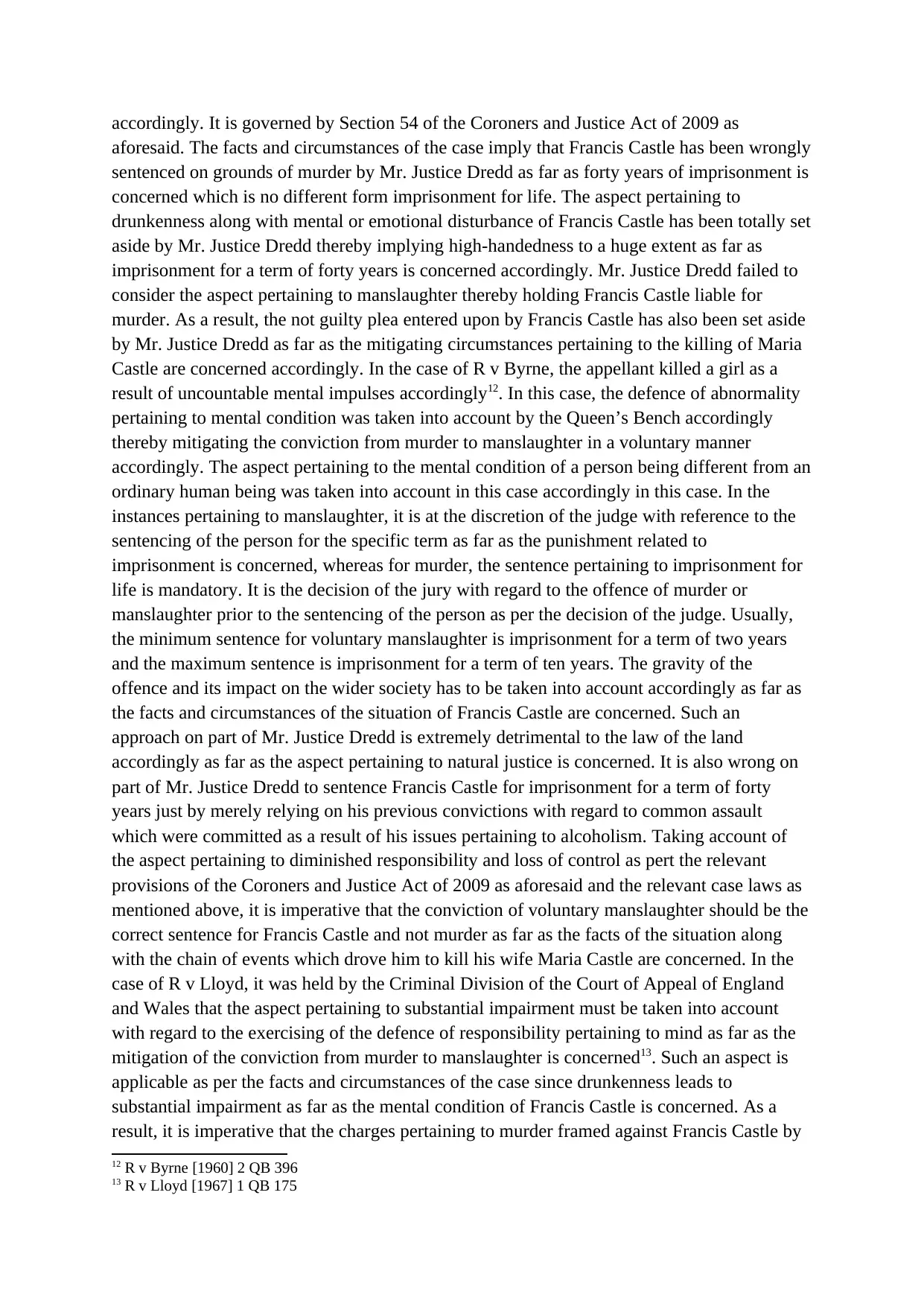
accordingly. It is governed by Section 54 of the Coroners and Justice Act of 2009 as
aforesaid. The facts and circumstances of the case imply that Francis Castle has been wrongly
sentenced on grounds of murder by Mr. Justice Dredd as far as forty years of imprisonment is
concerned which is no different form imprisonment for life. The aspect pertaining to
drunkenness along with mental or emotional disturbance of Francis Castle has been totally set
aside by Mr. Justice Dredd thereby implying high-handedness to a huge extent as far as
imprisonment for a term of forty years is concerned accordingly. Mr. Justice Dredd failed to
consider the aspect pertaining to manslaughter thereby holding Francis Castle liable for
murder. As a result, the not guilty plea entered upon by Francis Castle has also been set aside
by Mr. Justice Dredd as far as the mitigating circumstances pertaining to the killing of Maria
Castle are concerned accordingly. In the case of R v Byrne, the appellant killed a girl as a
result of uncountable mental impulses accordingly12. In this case, the defence of abnormality
pertaining to mental condition was taken into account by the Queen’s Bench accordingly
thereby mitigating the conviction from murder to manslaughter in a voluntary manner
accordingly. The aspect pertaining to the mental condition of a person being different from an
ordinary human being was taken into account in this case accordingly in this case. In the
instances pertaining to manslaughter, it is at the discretion of the judge with reference to the
sentencing of the person for the specific term as far as the punishment related to
imprisonment is concerned, whereas for murder, the sentence pertaining to imprisonment for
life is mandatory. It is the decision of the jury with regard to the offence of murder or
manslaughter prior to the sentencing of the person as per the decision of the judge. Usually,
the minimum sentence for voluntary manslaughter is imprisonment for a term of two years
and the maximum sentence is imprisonment for a term of ten years. The gravity of the
offence and its impact on the wider society has to be taken into account accordingly as far as
the facts and circumstances of the situation of Francis Castle are concerned. Such an
approach on part of Mr. Justice Dredd is extremely detrimental to the law of the land
accordingly as far as the aspect pertaining to natural justice is concerned. It is also wrong on
part of Mr. Justice Dredd to sentence Francis Castle for imprisonment for a term of forty
years just by merely relying on his previous convictions with regard to common assault
which were committed as a result of his issues pertaining to alcoholism. Taking account of
the aspect pertaining to diminished responsibility and loss of control as pert the relevant
provisions of the Coroners and Justice Act of 2009 as aforesaid and the relevant case laws as
mentioned above, it is imperative that the conviction of voluntary manslaughter should be the
correct sentence for Francis Castle and not murder as far as the facts of the situation along
with the chain of events which drove him to kill his wife Maria Castle are concerned. In the
case of R v Lloyd, it was held by the Criminal Division of the Court of Appeal of England
and Wales that the aspect pertaining to substantial impairment must be taken into account
with regard to the exercising of the defence of responsibility pertaining to mind as far as the
mitigation of the conviction from murder to manslaughter is concerned13. Such an aspect is
applicable as per the facts and circumstances of the case since drunkenness leads to
substantial impairment as far as the mental condition of Francis Castle is concerned. As a
result, it is imperative that the charges pertaining to murder framed against Francis Castle by
12 R v Byrne [1960] 2 QB 396
13 R v Lloyd [1967] 1 QB 175
aforesaid. The facts and circumstances of the case imply that Francis Castle has been wrongly
sentenced on grounds of murder by Mr. Justice Dredd as far as forty years of imprisonment is
concerned which is no different form imprisonment for life. The aspect pertaining to
drunkenness along with mental or emotional disturbance of Francis Castle has been totally set
aside by Mr. Justice Dredd thereby implying high-handedness to a huge extent as far as
imprisonment for a term of forty years is concerned accordingly. Mr. Justice Dredd failed to
consider the aspect pertaining to manslaughter thereby holding Francis Castle liable for
murder. As a result, the not guilty plea entered upon by Francis Castle has also been set aside
by Mr. Justice Dredd as far as the mitigating circumstances pertaining to the killing of Maria
Castle are concerned accordingly. In the case of R v Byrne, the appellant killed a girl as a
result of uncountable mental impulses accordingly12. In this case, the defence of abnormality
pertaining to mental condition was taken into account by the Queen’s Bench accordingly
thereby mitigating the conviction from murder to manslaughter in a voluntary manner
accordingly. The aspect pertaining to the mental condition of a person being different from an
ordinary human being was taken into account in this case accordingly in this case. In the
instances pertaining to manslaughter, it is at the discretion of the judge with reference to the
sentencing of the person for the specific term as far as the punishment related to
imprisonment is concerned, whereas for murder, the sentence pertaining to imprisonment for
life is mandatory. It is the decision of the jury with regard to the offence of murder or
manslaughter prior to the sentencing of the person as per the decision of the judge. Usually,
the minimum sentence for voluntary manslaughter is imprisonment for a term of two years
and the maximum sentence is imprisonment for a term of ten years. The gravity of the
offence and its impact on the wider society has to be taken into account accordingly as far as
the facts and circumstances of the situation of Francis Castle are concerned. Such an
approach on part of Mr. Justice Dredd is extremely detrimental to the law of the land
accordingly as far as the aspect pertaining to natural justice is concerned. It is also wrong on
part of Mr. Justice Dredd to sentence Francis Castle for imprisonment for a term of forty
years just by merely relying on his previous convictions with regard to common assault
which were committed as a result of his issues pertaining to alcoholism. Taking account of
the aspect pertaining to diminished responsibility and loss of control as pert the relevant
provisions of the Coroners and Justice Act of 2009 as aforesaid and the relevant case laws as
mentioned above, it is imperative that the conviction of voluntary manslaughter should be the
correct sentence for Francis Castle and not murder as far as the facts of the situation along
with the chain of events which drove him to kill his wife Maria Castle are concerned. In the
case of R v Lloyd, it was held by the Criminal Division of the Court of Appeal of England
and Wales that the aspect pertaining to substantial impairment must be taken into account
with regard to the exercising of the defence of responsibility pertaining to mind as far as the
mitigation of the conviction from murder to manslaughter is concerned13. Such an aspect is
applicable as per the facts and circumstances of the case since drunkenness leads to
substantial impairment as far as the mental condition of Francis Castle is concerned. As a
result, it is imperative that the charges pertaining to murder framed against Francis Castle by
12 R v Byrne [1960] 2 QB 396
13 R v Lloyd [1967] 1 QB 175
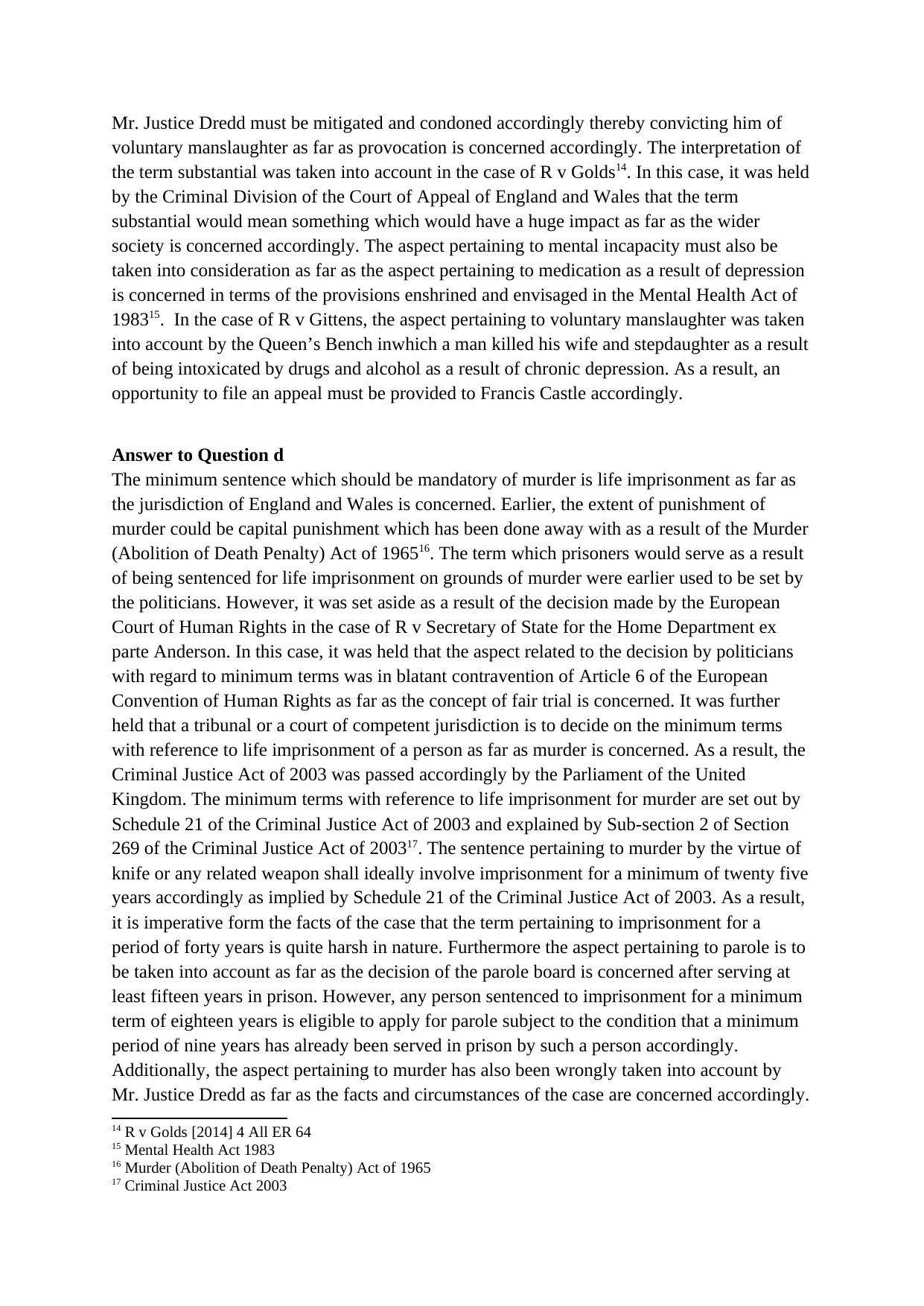
Mr. Justice Dredd must be mitigated and condoned accordingly thereby convicting him of
voluntary manslaughter as far as provocation is concerned accordingly. The interpretation of
the term substantial was taken into account in the case of R v Golds14. In this case, it was held
by the Criminal Division of the Court of Appeal of England and Wales that the term
substantial would mean something which would have a huge impact as far as the wider
society is concerned accordingly. The aspect pertaining to mental incapacity must also be
taken into consideration as far as the aspect pertaining to medication as a result of depression
is concerned in terms of the provisions enshrined and envisaged in the Mental Health Act of
198315. In the case of R v Gittens, the aspect pertaining to voluntary manslaughter was taken
into account by the Queen’s Bench inwhich a man killed his wife and stepdaughter as a result
of being intoxicated by drugs and alcohol as a result of chronic depression. As a result, an
opportunity to file an appeal must be provided to Francis Castle accordingly.
Answer to Question d
The minimum sentence which should be mandatory of murder is life imprisonment as far as
the jurisdiction of England and Wales is concerned. Earlier, the extent of punishment of
murder could be capital punishment which has been done away with as a result of the Murder
(Abolition of Death Penalty) Act of 196516. The term which prisoners would serve as a result
of being sentenced for life imprisonment on grounds of murder were earlier used to be set by
the politicians. However, it was set aside as a result of the decision made by the European
Court of Human Rights in the case of R v Secretary of State for the Home Department ex
parte Anderson. In this case, it was held that the aspect related to the decision by politicians
with regard to minimum terms was in blatant contravention of Article 6 of the European
Convention of Human Rights as far as the concept of fair trial is concerned. It was further
held that a tribunal or a court of competent jurisdiction is to decide on the minimum terms
with reference to life imprisonment of a person as far as murder is concerned. As a result, the
Criminal Justice Act of 2003 was passed accordingly by the Parliament of the United
Kingdom. The minimum terms with reference to life imprisonment for murder are set out by
Schedule 21 of the Criminal Justice Act of 2003 and explained by Sub-section 2 of Section
269 of the Criminal Justice Act of 200317. The sentence pertaining to murder by the virtue of
knife or any related weapon shall ideally involve imprisonment for a minimum of twenty five
years accordingly as implied by Schedule 21 of the Criminal Justice Act of 2003. As a result,
it is imperative form the facts of the case that the term pertaining to imprisonment for a
period of forty years is quite harsh in nature. Furthermore the aspect pertaining to parole is to
be taken into account as far as the decision of the parole board is concerned after serving at
least fifteen years in prison. However, any person sentenced to imprisonment for a minimum
term of eighteen years is eligible to apply for parole subject to the condition that a minimum
period of nine years has already been served in prison by such a person accordingly.
Additionally, the aspect pertaining to murder has also been wrongly taken into account by
Mr. Justice Dredd as far as the facts and circumstances of the case are concerned accordingly.
14 R v Golds [2014] 4 All ER 64
15 Mental Health Act 1983
16 Murder (Abolition of Death Penalty) Act of 1965
17 Criminal Justice Act 2003
voluntary manslaughter as far as provocation is concerned accordingly. The interpretation of
the term substantial was taken into account in the case of R v Golds14. In this case, it was held
by the Criminal Division of the Court of Appeal of England and Wales that the term
substantial would mean something which would have a huge impact as far as the wider
society is concerned accordingly. The aspect pertaining to mental incapacity must also be
taken into consideration as far as the aspect pertaining to medication as a result of depression
is concerned in terms of the provisions enshrined and envisaged in the Mental Health Act of
198315. In the case of R v Gittens, the aspect pertaining to voluntary manslaughter was taken
into account by the Queen’s Bench inwhich a man killed his wife and stepdaughter as a result
of being intoxicated by drugs and alcohol as a result of chronic depression. As a result, an
opportunity to file an appeal must be provided to Francis Castle accordingly.
Answer to Question d
The minimum sentence which should be mandatory of murder is life imprisonment as far as
the jurisdiction of England and Wales is concerned. Earlier, the extent of punishment of
murder could be capital punishment which has been done away with as a result of the Murder
(Abolition of Death Penalty) Act of 196516. The term which prisoners would serve as a result
of being sentenced for life imprisonment on grounds of murder were earlier used to be set by
the politicians. However, it was set aside as a result of the decision made by the European
Court of Human Rights in the case of R v Secretary of State for the Home Department ex
parte Anderson. In this case, it was held that the aspect related to the decision by politicians
with regard to minimum terms was in blatant contravention of Article 6 of the European
Convention of Human Rights as far as the concept of fair trial is concerned. It was further
held that a tribunal or a court of competent jurisdiction is to decide on the minimum terms
with reference to life imprisonment of a person as far as murder is concerned. As a result, the
Criminal Justice Act of 2003 was passed accordingly by the Parliament of the United
Kingdom. The minimum terms with reference to life imprisonment for murder are set out by
Schedule 21 of the Criminal Justice Act of 2003 and explained by Sub-section 2 of Section
269 of the Criminal Justice Act of 200317. The sentence pertaining to murder by the virtue of
knife or any related weapon shall ideally involve imprisonment for a minimum of twenty five
years accordingly as implied by Schedule 21 of the Criminal Justice Act of 2003. As a result,
it is imperative form the facts of the case that the term pertaining to imprisonment for a
period of forty years is quite harsh in nature. Furthermore the aspect pertaining to parole is to
be taken into account as far as the decision of the parole board is concerned after serving at
least fifteen years in prison. However, any person sentenced to imprisonment for a minimum
term of eighteen years is eligible to apply for parole subject to the condition that a minimum
period of nine years has already been served in prison by such a person accordingly.
Additionally, the aspect pertaining to murder has also been wrongly taken into account by
Mr. Justice Dredd as far as the facts and circumstances of the case are concerned accordingly.
14 R v Golds [2014] 4 All ER 64
15 Mental Health Act 1983
16 Murder (Abolition of Death Penalty) Act of 1965
17 Criminal Justice Act 2003
⊘ This is a preview!⊘
Do you want full access?
Subscribe today to unlock all pages.

Trusted by 1+ million students worldwide
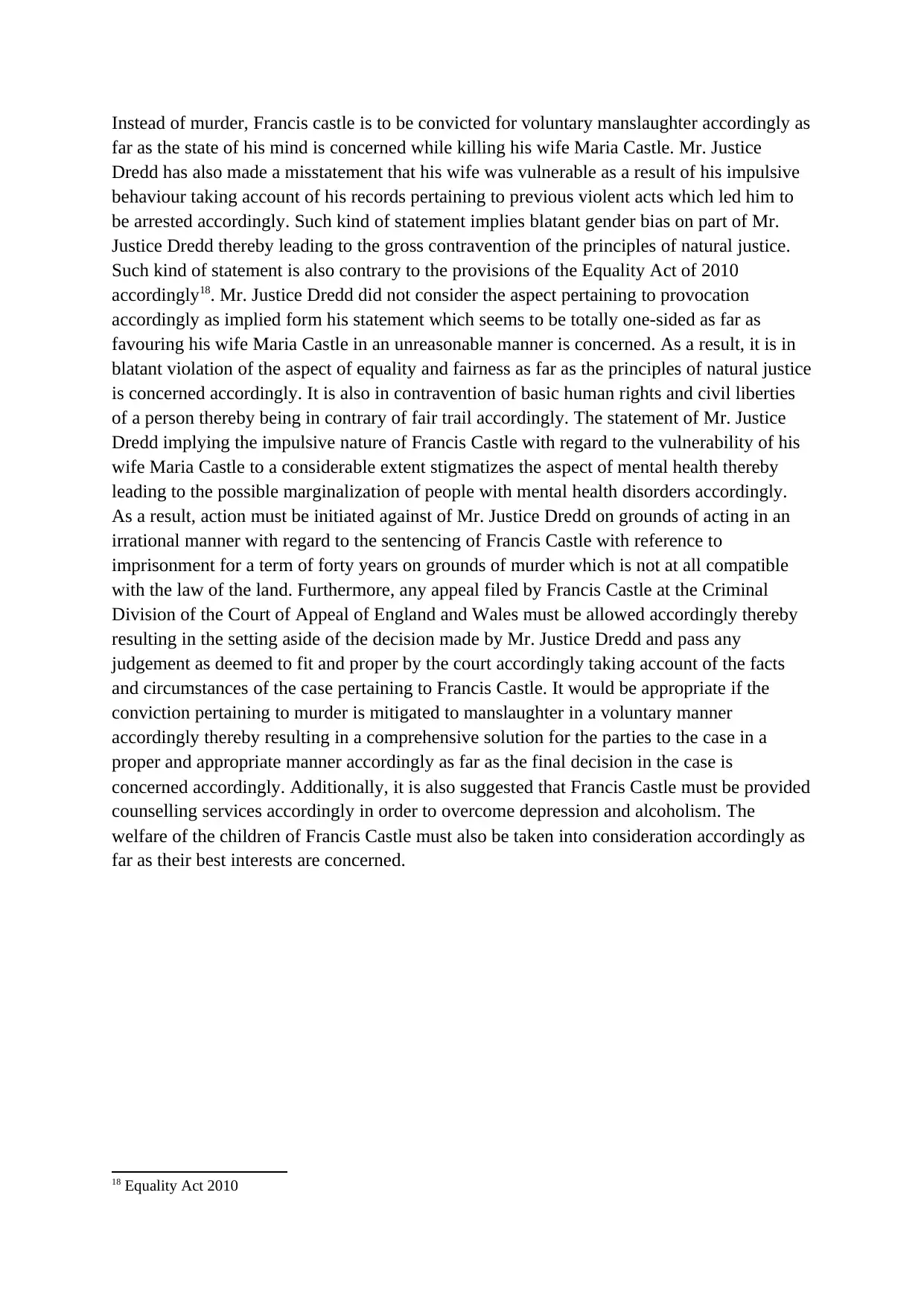
Instead of murder, Francis castle is to be convicted for voluntary manslaughter accordingly as
far as the state of his mind is concerned while killing his wife Maria Castle. Mr. Justice
Dredd has also made a misstatement that his wife was vulnerable as a result of his impulsive
behaviour taking account of his records pertaining to previous violent acts which led him to
be arrested accordingly. Such kind of statement implies blatant gender bias on part of Mr.
Justice Dredd thereby leading to the gross contravention of the principles of natural justice.
Such kind of statement is also contrary to the provisions of the Equality Act of 2010
accordingly18. Mr. Justice Dredd did not consider the aspect pertaining to provocation
accordingly as implied form his statement which seems to be totally one-sided as far as
favouring his wife Maria Castle in an unreasonable manner is concerned. As a result, it is in
blatant violation of the aspect of equality and fairness as far as the principles of natural justice
is concerned accordingly. It is also in contravention of basic human rights and civil liberties
of a person thereby being in contrary of fair trail accordingly. The statement of Mr. Justice
Dredd implying the impulsive nature of Francis Castle with regard to the vulnerability of his
wife Maria Castle to a considerable extent stigmatizes the aspect of mental health thereby
leading to the possible marginalization of people with mental health disorders accordingly.
As a result, action must be initiated against of Mr. Justice Dredd on grounds of acting in an
irrational manner with regard to the sentencing of Francis Castle with reference to
imprisonment for a term of forty years on grounds of murder which is not at all compatible
with the law of the land. Furthermore, any appeal filed by Francis Castle at the Criminal
Division of the Court of Appeal of England and Wales must be allowed accordingly thereby
resulting in the setting aside of the decision made by Mr. Justice Dredd and pass any
judgement as deemed to fit and proper by the court accordingly taking account of the facts
and circumstances of the case pertaining to Francis Castle. It would be appropriate if the
conviction pertaining to murder is mitigated to manslaughter in a voluntary manner
accordingly thereby resulting in a comprehensive solution for the parties to the case in a
proper and appropriate manner accordingly as far as the final decision in the case is
concerned accordingly. Additionally, it is also suggested that Francis Castle must be provided
counselling services accordingly in order to overcome depression and alcoholism. The
welfare of the children of Francis Castle must also be taken into consideration accordingly as
far as their best interests are concerned.
18 Equality Act 2010
far as the state of his mind is concerned while killing his wife Maria Castle. Mr. Justice
Dredd has also made a misstatement that his wife was vulnerable as a result of his impulsive
behaviour taking account of his records pertaining to previous violent acts which led him to
be arrested accordingly. Such kind of statement implies blatant gender bias on part of Mr.
Justice Dredd thereby leading to the gross contravention of the principles of natural justice.
Such kind of statement is also contrary to the provisions of the Equality Act of 2010
accordingly18. Mr. Justice Dredd did not consider the aspect pertaining to provocation
accordingly as implied form his statement which seems to be totally one-sided as far as
favouring his wife Maria Castle in an unreasonable manner is concerned. As a result, it is in
blatant violation of the aspect of equality and fairness as far as the principles of natural justice
is concerned accordingly. It is also in contravention of basic human rights and civil liberties
of a person thereby being in contrary of fair trail accordingly. The statement of Mr. Justice
Dredd implying the impulsive nature of Francis Castle with regard to the vulnerability of his
wife Maria Castle to a considerable extent stigmatizes the aspect of mental health thereby
leading to the possible marginalization of people with mental health disorders accordingly.
As a result, action must be initiated against of Mr. Justice Dredd on grounds of acting in an
irrational manner with regard to the sentencing of Francis Castle with reference to
imprisonment for a term of forty years on grounds of murder which is not at all compatible
with the law of the land. Furthermore, any appeal filed by Francis Castle at the Criminal
Division of the Court of Appeal of England and Wales must be allowed accordingly thereby
resulting in the setting aside of the decision made by Mr. Justice Dredd and pass any
judgement as deemed to fit and proper by the court accordingly taking account of the facts
and circumstances of the case pertaining to Francis Castle. It would be appropriate if the
conviction pertaining to murder is mitigated to manslaughter in a voluntary manner
accordingly thereby resulting in a comprehensive solution for the parties to the case in a
proper and appropriate manner accordingly as far as the final decision in the case is
concerned accordingly. Additionally, it is also suggested that Francis Castle must be provided
counselling services accordingly in order to overcome depression and alcoholism. The
welfare of the children of Francis Castle must also be taken into consideration accordingly as
far as their best interests are concerned.
18 Equality Act 2010
Paraphrase This Document
Need a fresh take? Get an instant paraphrase of this document with our AI Paraphraser
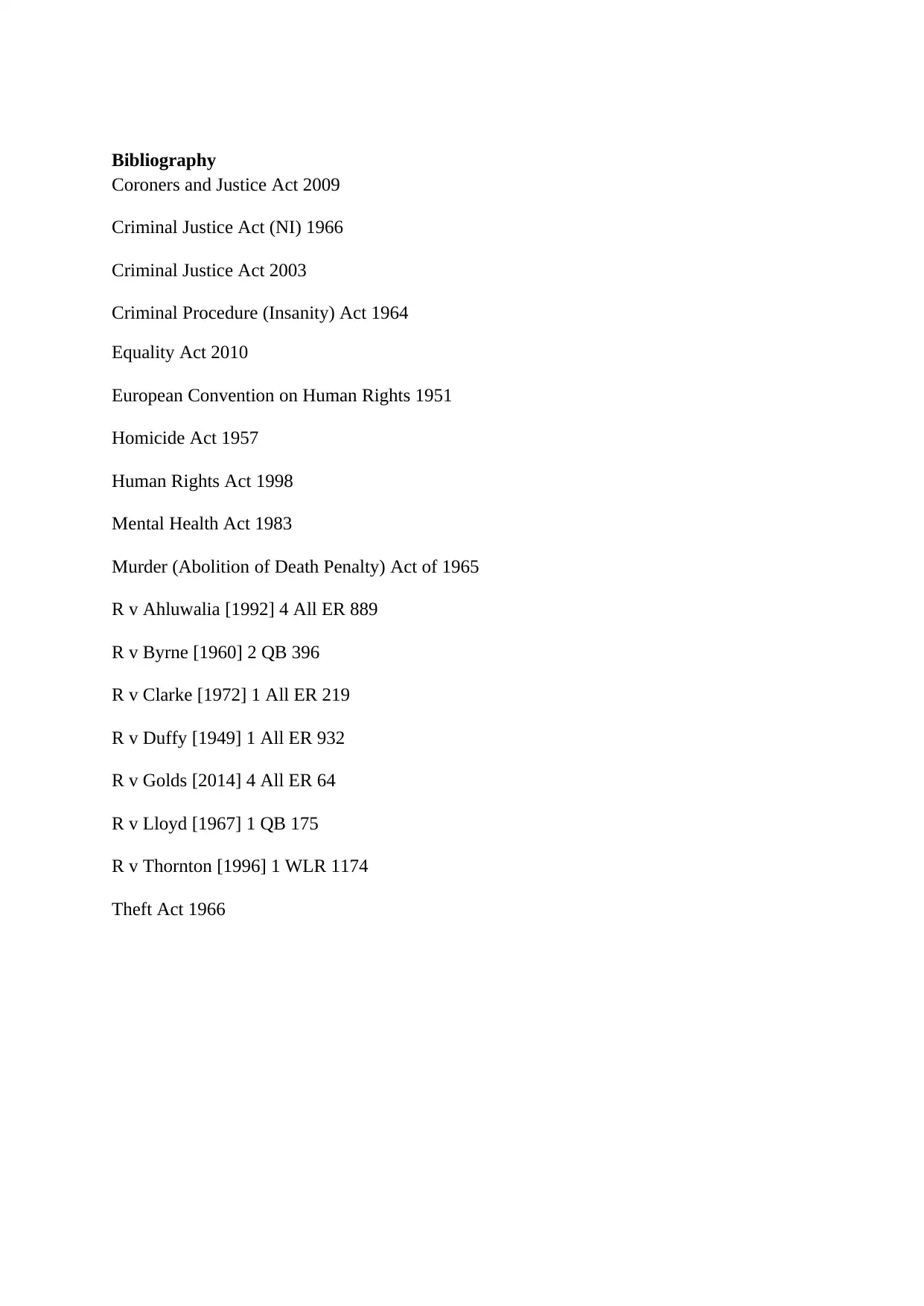
Bibliography
Coroners and Justice Act 2009
Criminal Justice Act (NI) 1966
Criminal Justice Act 2003
Criminal Procedure (Insanity) Act 1964
Equality Act 2010
European Convention on Human Rights 1951
Homicide Act 1957
Human Rights Act 1998
Mental Health Act 1983
Murder (Abolition of Death Penalty) Act of 1965
R v Ahluwalia [1992] 4 All ER 889
R v Byrne [1960] 2 QB 396
R v Clarke [1972] 1 All ER 219
R v Duffy [1949] 1 All ER 932
R v Golds [2014] 4 All ER 64
R v Lloyd [1967] 1 QB 175
R v Thornton [1996] 1 WLR 1174
Theft Act 1966
Coroners and Justice Act 2009
Criminal Justice Act (NI) 1966
Criminal Justice Act 2003
Criminal Procedure (Insanity) Act 1964
Equality Act 2010
European Convention on Human Rights 1951
Homicide Act 1957
Human Rights Act 1998
Mental Health Act 1983
Murder (Abolition of Death Penalty) Act of 1965
R v Ahluwalia [1992] 4 All ER 889
R v Byrne [1960] 2 QB 396
R v Clarke [1972] 1 All ER 219
R v Duffy [1949] 1 All ER 932
R v Golds [2014] 4 All ER 64
R v Lloyd [1967] 1 QB 175
R v Thornton [1996] 1 WLR 1174
Theft Act 1966
1 out of 11
Your All-in-One AI-Powered Toolkit for Academic Success.
+13062052269
info@desklib.com
Available 24*7 on WhatsApp / Email
![[object Object]](/_next/static/media/star-bottom.7253800d.svg)
Unlock your academic potential
Copyright © 2020–2026 A2Z Services. All Rights Reserved. Developed and managed by ZUCOL.

